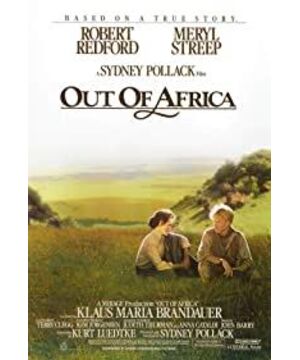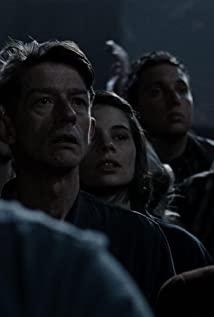"Under the scorching sun and the wind is still there, but it has nothing to do with me. You are right, we are just passing by. I should leave this piece of loess in my hands. The love that accompanies a lifetime only belongs to the lucky ones, and it does not belong to me here. After all, I backfired and was broken. Who should I ask about these loves, these hates?"
---Karen Pelican "Far Away from Africa"
At the age of 28, Karen came to Kenya, Africa alone , On this land, she cast all her possessions without reservation, and built her own home with one hand and one foot. Seventeen years later, she had nothing and left alone, but deeply buried in her heart the memories of those she had loved, hated, gained, and lost. In the last years of her life, she turned this irresistible memory into words, engraved it in the wind, and let eternity bring her back to the land and the person she loved.
This is the background of the film "Far From Africa," a 1985 American film based on the autobiographical novel of the same name by Danish writer Karen Burrisson, starring Meryl Streep and Robert Redford. , won seven Oscars, including best picture and best director. Most of the film's scenes were shot in Africa. The magnificent African grasslands and realistic animals and beasts set off the magnificent epic momentum of this 160-minute work.
Although this is an epic work that has won numerous awards, the evaluation of this work has been polarized. The time period of the story is between 1913 and 1930, which is the period of the crazy expansion of colonialism in Africa and the outbreak of the First World War, but the film does not pay much attention to this part, and it is more about the love of the protagonist. Stories to bring out perspectives and critiques of big events. In this regard, I have exactly the opposite view. The film discusses "aggression" and "possession" in a non-specific way. Although it was unavoidably suspected of avoiding the important at the time, with the changes of the times, it seems that there is a kind of generalization now. Appropriate value and meaning emerge.
■The protagonist of the film Karen is a Danish woman from a wealthy family, independent and open-minded. In order to leave the closed social circle in Denmark, she took the initiative to ask a male friend named Blow for marriage at the cost of money. Although Blow bears the title of Baron of Sweden, he is very poor and lives in Kenya, Africa all the year round. After the two negotiated the terms, Blow went back to Kenya to buy land and build a house with the funds given by Karen, and waited for Karen to arrive and then get married there.
Blow's nature is not bad, but he has the habit of being ambitious and playing with the world. Therefore, after Karen arrived in Kenya, she had to take over all the construction work of the manor and personally lead the local African natives to reclaim wasteland and plant coffee. Initially, Karen and Blow really had the intention to be a loving couple, to take root and raise children in the local area. Karen even risked her life to cross the African grasslands and personally sent Blow the necessary supplies during the war. supplies. However, when Karen was infected with syphilis by Blow and became barren for life, all possibilities became impossible, and the two were separated for a long time. Karen worked alone with African natives, maintained the crops and livelihoods of the estate, and established simple schools to teach local natives to learn English and read and write.
Dennis is an Englishman who has also lived in Kenya for many years. He usually makes a living by leading foreign hunters in and out of the African grasslands. Dennis is a man like the wind, who likes to be alone, hates war, and hates a stable but immutable life. In this old-fashioned era, in a land full of men, Karen is like an outlier, but Dennis admires this maverick and rampant woman immensely. He took her on an adventure to the African savannah, played Mozart to her in the jungle, washed her hair and combed her hair by the river, and took her on a plane to soar in the sky. Karen thought the fact that she was infertile would scare Dennis off, but he didn't care.
It's just that Karen later learned that this wind-like man didn't care about more than this matter, he also cared about his "don't care" very much. After Karen and Blow separated, Dennis stayed with Karen and moved all his belongings to Karen's house for storage. But he always came and went, never staying with Karen for too long. Later, Karen's husband Blow met another rich woman and took the initiative to ask Karen for a divorce, and Karen turned to Dennis to ask about his plans. Of course Dennis understood that Karen wanted a marriage contract, but he flatly refused.
Karen is such a woman who pursues what she wants resolutely and resolutely. For the people and things she loves, she hopes to protect them by her side and dedicate all her beauty to each other. So when she came to Kenya, she brought furniture, accessories, and even crystal china from her home, in order to decorate the Kenyan home exactly like the Danish home. When she first came, she intercepted the river on the edge of the manor in order to have a pond of her own. And when she knew she was infertile, she disregarded everyone's opposition and insisted on setting up a school to teach indigenous children to learn. "Have and give" is her approach to love.
But Dennis doesn't like this kind of love. He thinks that love should keep the other person in his own way and give the other person the right to choose freely. Dennis doesn't want to possess anything, and he doesn't want to be possessed. He said that we are all travelers in our lives. We don't really have anything. The so-called possession is just an appearance, and eventually we will lose it. Dennis not only disliked Karen's idea of tying him, but also disliked Karen's Kenyan home being built to resemble her Danish home, and Karen's insistence on providing English-language education for indigenous children. He said that Karen always confuses "needs" and "wants". These possessions and transformations Karen imposes, although they are all in the name of "needs" and in the name of being good for each other, but they are actually because of her own Selfishness and prejudice are entirely because "she" wants.
On the surface, Dennis blamed Karen's attitude towards love, but in fact it was the film that blamed the foreign colonizers for their attitudes and positions towards this land of Africa: a kind of arrogance of superior values, a kind of self-centered cultural arrogance, The development of this land and the education of the local people by the Western colonists were not based on the "needs" of the other party, but out of their own "want". Dennis told Karen bluntly that he didn't want to be a part of someone else's life, and while he had to pay for it and have to endure loneliness, it was fair. He also said that Karen has the same right to choose. Although she wants someone to belong to her completely, it is impossible. Flowers will wither and people will die. Every life is an independent entity, and no one can have more.
Dennis and Karen finally broke up. Karen couldn't accept Dennis's values. She made her own choice: if she couldn't fully possess it, she would let it go completely. However, when the game of life finally came out, it proved that what Dennis said was right, and no one could really have anything. In a heavy rain, the pond in Karen Manor burst its banks, and the gurgling river rushes away and returns to its own direction. In the days when the coffee was finally plentiful, a fire destroyed everything in the warehouse. And when Karen decided to leave and waited for Dennis to see him off, the news of his death came, and the plane crash took his life. Every grass, tree, flower and tree in Africa does not belong to Karen, and she can neither take it away nor keep it.
■Dennis once said that he doesn't care if Karen is someone else's wife, he only cares about his heart for her, a marriage contract will not make him love more or less. Yes, although Karen cannot own an African manor or Dennis, the love of the local indigenous people for her and the love of this man like the wind for her will always belong to her, and no one can take it away. This is forever. Love. After Karen left Africa, the local area fell into the snatch of the colony, and the British colonists later had continuous bloody conflicts with the local aborigines until they evacuated Kenya in the 1960s. Who can really own what?
View more about Out of Africa reviews











